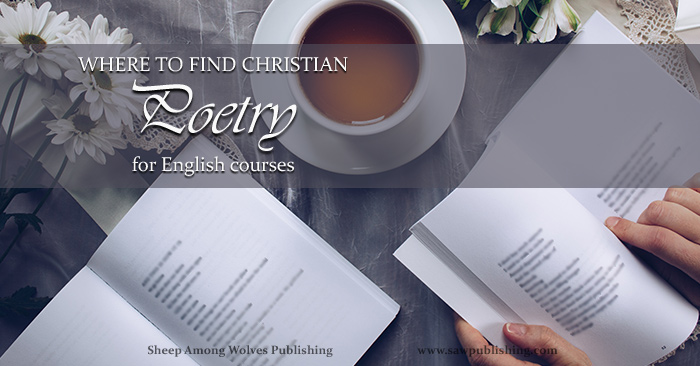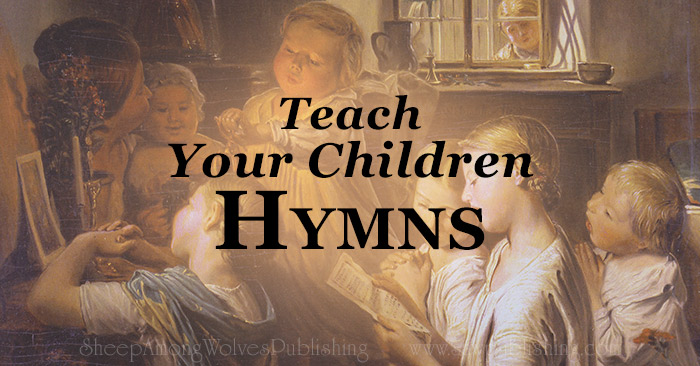Where to Find Christian Poetry for English Courses
 Do you remember anything you learned in Preschool? Kindergarten? Grade One?
Do you remember anything you learned in Preschool? Kindergarten? Grade One?
I don’t mean just, “I learned to read” or “I learned addition and subtraction.” I mean, do you remember anything specific you were taught in those early years of your education?
I do. It was a poem—actually several poems. I learned some of them when I was three or four—before I could read—and I remember them today. I remember them with fondness, and I remember them with accuracy. No, they weren’t long. No, they weren’t earthshattering. But I remember them all these years later—they stayed with me.
And I’m not sure about this, but I wonder whether they helped to kindle in me a love of poetry which is a constant blessing to me even now.
Would you like to teach your children something that powerful? Something that will stick with them long after they’ve forgotten so much of what they learned in those early years? Something that will impact them positively for the rest of their lives—and eternity?
Would you like to teach them Christian poetry, while they are still young, and give them a valuable legacy that will never grow old? I know I would.
 The Value of Christian Poems
The Value of Christian Poems
Since the literature our children are exposed to will shape their standards of literature for the rest of their lives, it is of the utmost importance that we choose their reading material carefully—whether it be prose or poetry.
Poetry which is good, and will increase their understanding of the things which are good without increasing their knowledge of evil, is of course the first priority, since the effect on their souls is the only thing that will matter for eternity.
But it is also important to select poetry that is great, because we are establishing their understanding of great language, as well as allowing them to experience the power of goodness expressed through greatness.
The Christian homeschooler will often find it beneficial—sometimes necessary—to look for external sources of “good and great” poetry to supplement the curriculum they already have—or to replace elements and examples in courses written from a less-than-godly perspective.
Where to Find Christian Poetry for English Courses
Christian Poetry Classics
One valuable source of Christian poetry is classic authors from the past—some well-known, some less-known but worth knowing. While not all of these poems will be directly “Christian” or written by men and women we can unequivocally approve of, they still fall into the class of “good” poems.
Click on the links below to view a few worthwhile examples:
- “The Poplar Field” by William Cowper
- “The Daffodils” by William Wordsworth
- “Another Year is Dawning” by Frances R. Havergal
- “September” by Helen Hunt Jackson
- “The Oak Tree” by Cecil Frances Alexander
- “Writing on Sand” from Monroe’s Reader 1872
Christian Poetry in the 21st Century
While the past is an excellent place to look for valuable resources of Christian poetry, I believe that there is also a great need for wholesome Christian poems to be written in our day and age. If we cease to write great Christian poetry, it will likely be the first step toward losing the heritage of poetry that we have received.
I feel very passionate about this topic, and am offering a few of my own poems below, in the hope that they may be a blessing, and may encourage others to write good and great poems today.
- “November Beauty”
- “First Snow”
- “It Is the Start and Yet the End”
- “Footprints in the Snow”
- “Breezes from My Childhood”
- “On the Seas of Life”
- “Whatsoever With Thy Might”
- “My Chickadee”
How to Use Christian Poetry in Your Homeschool
Perhaps some of you feel that you recognize the value of Christian poetry in your children’s lives, but are unsure how to integrate it into your homeschool. Depending on your situation and curricula, this may mean thinking outside the box.
However, there are many fun and unique ways of introducing poems into your school day, including using poems for:
- penmanship/copy work
- memory assignments
- art projects and mottos
- read-aloud time
- typing practice or keyboarding skills
- supplemental reading for English and literature courses
- supplemental reading for history courses
There are probably many other ways of including poems in your homeschool, and I encourage you to search for them! A really great poem tied into a project from another subject can be an incredible way of fixing the information in your students’ minds.
Christian Poetry is Worth the Effort!
Sometimes it can feel like homeschooling is a lot of work and a lot of trouble—sometimes teaching things that your students are just going to forget anyway. Sometimes—in some subjects—it might be that way.
But Christian poetry imprinted on your child’s memory, isn’t going to be like that. They will remember these poems perhaps twenty, thirty, forty, or even fifty years down the road.
And even more important than the things which they will remember, is the precious gift of never remembering a time when the great, beautiful truths of our faith have not been well-known and beloved in the rich heritage of Christian poems and hymns familiar to ears and lips.
Christian poetry is worth the effort, and it is our aim to provide you with a dependable source of good and great poems that can have this kind of effect on your child’s life.
Have you found good Christian poems, and unique ways of incorporating them into your homeschool? We would love to hear from you in the comment section below!
Interested in learning more about the importance of poetry and hymns in raising children? Read our post “Four Reasons to Teach Your Children Hymns.”

Isaac Watts’ four reasons to teach your children hymns challenges you to make use of his powerful tool for training the next generation.
You might also enjoy:

Are you looking for a Christian course that will teach your high school student to write poetry? Check out our FREE 10 Weeks to Writing Good and Great Poetry.

What are your goals for the coming year, when you think of yourself, your children, and your books? What we read as Christians has a profound impact on our lives and souls.

Most homeschoolers recognize the value of books, but a lot hinges on how we pass them on to our students. Give them the legacy of literature by reading aloud books that are good and great.
